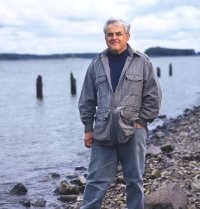"The oil transfer terminal at Port Westward has far-reaching consequences for Oregon and beyond"
By Jim Lichatowich
In the 1930s, the federal government and a few private corporations launched a massive dam building program in the Columbia Basin. After Grand Coulee and Bonneville dams were built, fishermen, cannery owners and biologists were concerned about the effect more dams would have on the massive salmon runs. They asked for a moratorium on additional dams below Umatilla. However, the U. S. Secretary of the Interior, Julius Krug, approved a memorandum that cleared the way for the full development of the river’s hydroelectric potential; it stated: “It is, therefore, the conclusion of all concerned that the overall benefits to the Pacific Northwest from a thorough-going development of the Snake and Columbia are such that the present salmon run must be sacrificed.” The “all concerned” did not include the fishermen, and the communities that depend on salmon fishing. They were to be sacrificed. The dam building era came to an end in 1975 with the defeat of the proposed High Mountain Sheep Dam in Idaho.
Just five years later, in 1980, the U. S. Congress had second thoughts about the narrow-minded decision to sacrifice the salmon and the local economies they sustained. It passed the Northwest Power Act, which launched the massive salmon restoration program that has to date cost the region’s ratepayers 15.3 billion dollars. Sometimes political leaders with narrow visions overlook things that people value, things like salmon.
We are now in the mist of another energy boom pushed by another small group with a narrow-minded approach. Oil trains are moving massive amounts of this climate-changing fuel down the Columbia River to Port Westward near Clatskaine. The current leaders in Columbia County are building a major oil transfer terminal at Port Westward, but unlike Secretary of Interior Krug in that earlier era, they will not publically admit what they are willing to sacrifice – salmon, farms and the health and safety of people living along the rail line. They are creating an industrial sacrifice zone with consequences beyond Columbia County. The salmon illustrate the potential far-reaching effects.
Think of the Columbia River as a large funnel. Port Westward is in the constricted end and the upper part of the basin the wide end. Juvenile salmon pour into the wide end from all the tributaries and all of the young salmon pass through the constricted end on their way to sea. Some rear for an extended period in the lower river near Port Westward. Now imagine human or mechanical error causing a major oil spill that plugs the restricted end of the funnel during the juvenile or adult salmon migration or during the fishing season. It would put at severe risk 15 billion dollars worth of salmon restoration. Salmon from tributaries many miles from Port Westward such as the Willamette the Deschutes or the Snake would be at risk.
In the narrow-minded rush to create a major oil transfer terminal at Port Westward, political leaders have given little indication that they are aware that the river is also the salmon’s home.
Those same leaders have shown little concern or awareness of the threat of climate change from the burning of fossil fuels. What are we doing? The expansion of the oil transfer terminal at Port Westward is encouraging the burning of more of these climate-changing fuels. The consequences will extend beyond Oregon and beyond this generation of Oregonians. Can we really call this economic development?
I support developing clean industries that do not put our grandchildren’s climate at risk. I support development that is cautious about putting at risk what we value in Oregon. Our political and economic leaders are putting too much at risk with their narrow-minded pursuit of an industrial sacrifice zone at Port Westward. When confronted with these risks, they either don’t understand the people’s concern or they show a naive faith that everything will turn out OK.
How much will Port Westward add to the salmon recovery bill? How much will Port Westward add to the burden of climate change our grandchildren will have to contend with?
Jim Lichatowich lives in Columbia City and is the author of two award winning books about salmon. Salmon without Rivers (1999) and Salmon People and Place (2013). He has worked on Pacific salmon issues as a researcher, manager, and scientific advisor for more than forty years. He has served many years on the Independent Scientific Advisory Board for the Columbia River salmon restoration program, the State of Oregon’s Independent Multidisciplinary Science Team, and on other independent scientific review panels in British Columbia and California.
This op-ed about salmon recovery and oil spills, originally published in the Sustainable Life section of the Pamplin Group papers.



